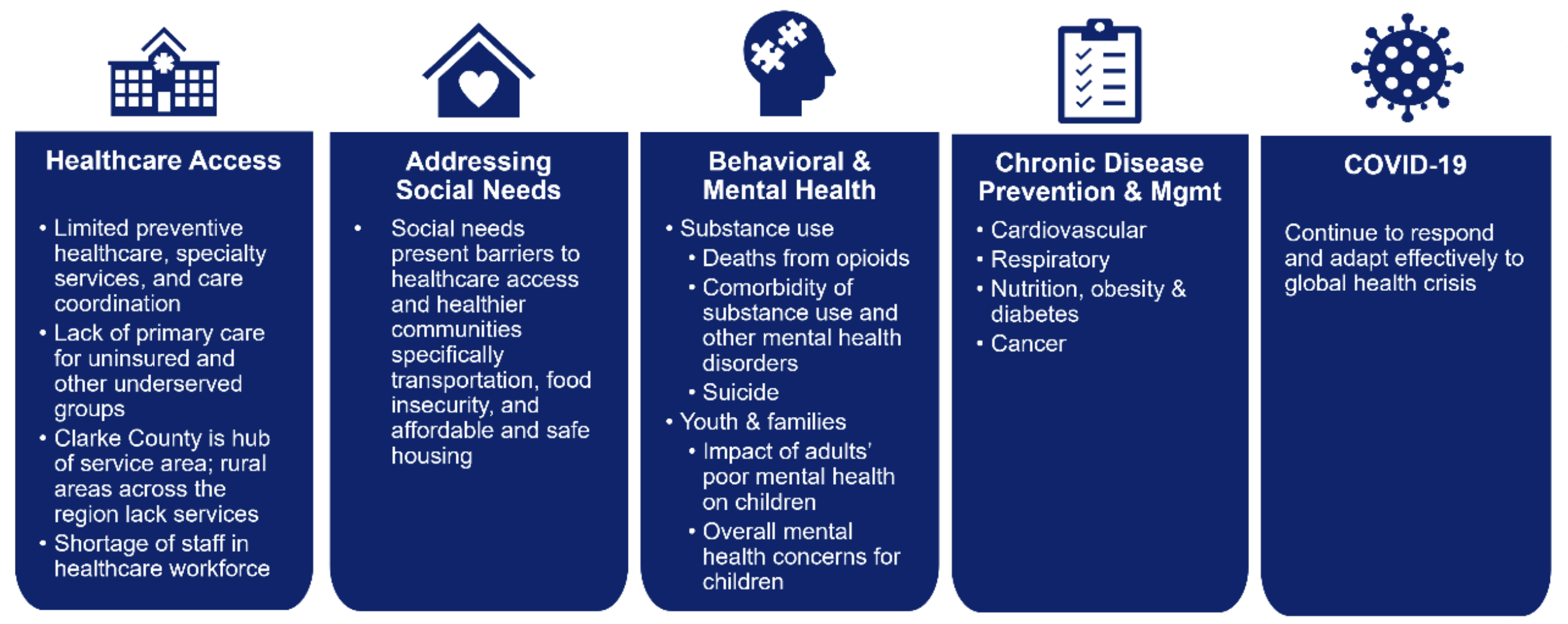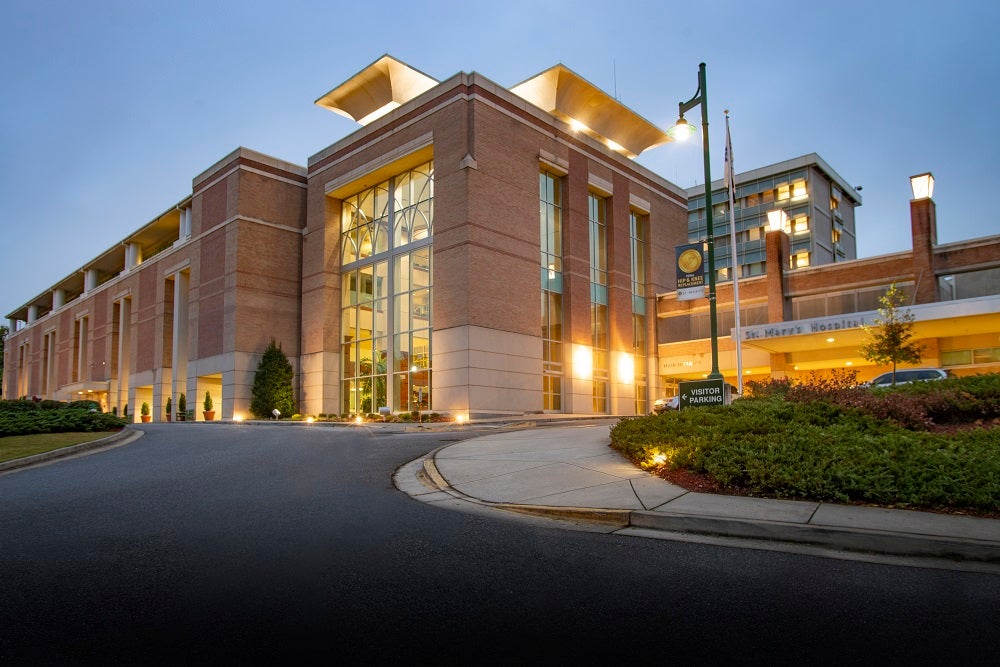What is a Community Health Needs Assessment?
July 17, 2022A look at how we focus our community health efforts
We all know our communities have a lot of health needs. St. Mary’s is committed to addressing those needs to the best of our ability. But we can’t do everything, so we have to figure out how to best use our limited resources to leverage the most change in key areas. The once-every-three-years Community Health Needs Assessment provides the information we need to make these important decisions. It’s also an IRS requirement for all non-profit hospitals.
1. What’s a Community Health Needs Assessment and why do you do it?
As part of the Patient Protection and Affordable Care Act, non-profit hospitals across the country have a legal responsibility to conduct a Community Health Needs Assessment (also known as an CHNA) every 3 years. CHNAs give hospitals the opportunity to learn more about the current health needs of the people they serve. The assessments also help inform hospital’s strategies surrounding community outreach and health education.
Every hospital is required to share results of its CHNA and accompanying implementation strategy on their website. You can find digital copies of every St. Mary’s Health Care System’s CHNA since 2010— including the 2022 edition.
2. How did you conduct the 2022 CHNA?
St. Mary’s Community Health and Well-being Department led the 2022 CHNA process. This included:
- Reviewing formal comments on the 2019 CHNA and implementation strategy.
- Inviting representatives from community-based health and public service organizations, medical professionals, and hospital staff to participate in focus groups and individual interviews. The discussions focused on: (1) community health needs, (2) existing resources and assets, and (3) recommendations for identified needs.
- Reviewing secondary data from the U.S. Census Bureau (including the 2020 Census and the American Community Survey), the Behavioral Risk Factor System, our own emergency departments, and other sources.
- Prioritizing the needs identified based on data, stakeholder feedback, and existing community resources and assets.
- Sharing findings with our community. For example, through this blog post and making the full report.
3. What did you find out?
We conducted the CHNA process for each of the three multi-county regions served by our hospitals: St. Mary’s Hospital in Athens, St. Mary’s Sacred Heart Hospital in Lavonia, and St. Mary’s Good Samaritan Hospital in Greensboro. Although the order of priority varies slightly from one hospital service area to another, the 2022 CHNA for St. Mary’s Health Care System as a whole identified the following as critical needs:
- health care access
- social needs, including transportation and food insecurity
- behavioral and mental health, and
- prevention and management of chronic conditions.
The assessment also highlighted that we must continue to effectively respond and adapt to COVID-19, as needed.

4. Were the 2022 needs similar to what you identified in 2019?
Yes and no. The priority needs identified in our 2019 CHNA centered around healthcare access and prevention and management of chronic conditions such as diabetes, cardiovascular health, respiratory health and cancer.
The 2022 CHNA process again identified these two areas of need, but also identified two additional critical concerns: addressing social needs and mental/behavioral health. There was also the understanding among many of our stakeholders that we will have to continue to respond and adapt effectively to the ongoing COVID-19 pandemic.
5. What do you do with the findings?
We will develop an implementation strategy to help address the needs identified in the CHNA. We make every effort to follow this plan for the following three years while remaining nimble enough to address emergent needs.
For example, the 2019 CHNA revealed that many of our community members were having difficulty accessing primary and specialty healthcare. Between 2020 and 2022, St. Mary’s improved its referral system to local primary care providers and provided financial and in-kind support to clinics for people who are uninsured or under-insured. Along the way, the COVID-19 pandemic struck.
Arising in early 2020, the pandemic created multiple large and often urgent demands on community health that we could not have anticipated just a few months earlier. To help address those needs, St. Mary’s collaborated with community-based partners such as the Department of Public Health and Innovative Healthcare Institute to educate the community about the disease and to provide mass testing and vaccination events for vulnerable populations.
We are still working on our implementation plan for the 2022 CHNA. We will share it on our Community Benefit webpage before the end of this year.
6. How can I help?
There are many things you can do to help our communities get healthier, including:
Lead by example.
By eating healthy foods, exercising, not smoking, and visiting your primary care doctor at least once a year, you’re modeling healthy behaviors to your loved ones, neighbors, and coworkers!
Collaborate.
Are you part of an organization or business in our 17-county service area? There may be opportunities to collaborate with our Community Health and Well-being Department to address key priority health needs. Please see the contact information below.
- For St. Mary’s Health Care System, serving Clarke, Oconee, Walton, Barrow, Jackson, Madison, and Oglethorpe counties: Alejandra Calva, alejandra.calva@stmarysathens.org
- For Sacred Heart Hospital, serving Franklin, Hart, Stephens, Banks, and Elbert counties: Lindsey Floyd, lindsey.floyd@stmarysathens.org
- For Good Samaritan Hospital, serving Greene, Putnam, Morgan, Taliaferro, and Hancock counties: Lindsey Floyd, lindsey.floyd@stmarysathens.org
Volunteer & support.
There are many organizations in our communities dedicated to supporting people in need. You can offer your time or talents to aid in their mission. Not sure where to start? Visit our Community Resource Directory, type in your area of interest and zip code, and contact the organization directly.
If you live close to one of our hospitals in Athens, Lavonia, or Greensboro, you can volunteer with us, too! Visit our volunteer webpage to learn more.
St. Mary’s is committed to the principle that addressing the key healthcare needs of our communities is the best way to help our families, friends and neighbors live their best and healthiest life. We care, and we hope you will join us in this important work.

